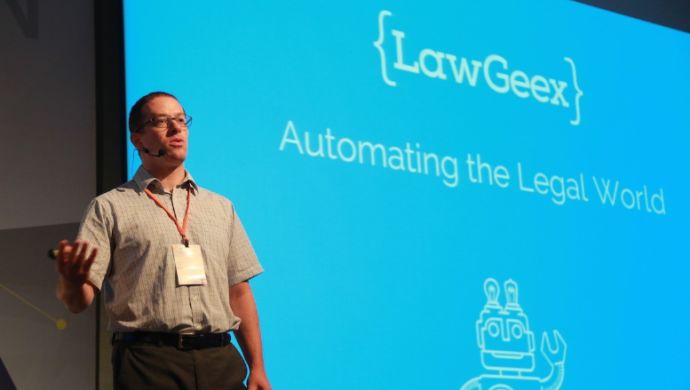LawGeex is a startup company that focuses on building an AI-powered legal contract review system, which speeds up the contract approval process

Israel-based AI startup LawGeex builds tools that harness the power of AI to automatically review legal contracts.
Since its founding in 2014, the firm has raised funding of about US$21 million, and is hiring talents at the speed of a person a week, according to Shmuli Goldberg, the company’s vice president of marketing.
Goldberg, who joined LawGeex over two years ago, spoke with Business Next recently during the 2018 Taiwan-Israel Innotech Summit event.
The interview took place at the venue of the summit, the Taipei International Convention Center.
Q: What is LawGeex?
A: LawGeex is a startup company that focuses on building an AI-powered legal contract review system, which speeds up the contract approval process. The firm was founded in 2014. The whole team is about 60 people from all around the world.
We’re still growing and we’re hiring more talents. We have raised just over US$20 million. We’ve raised quite a lot of funding [as there’s a lot of market demand.] We believe we have a first-mover advantage. Within two years to three years, we’re going to have competitors. Our goal is to take as much of the market while we still have that advantage. [Our products are already commercially available.]
Also Read: Philippines increasingly likely to legalise cryptocurrency exchanges
Q: What are the markets that you’re trying to reach?
A: The main target market is the US. We have quite a lot of customers in Asia as well. We’re focusing on English contracts. For the Asian markets, if English isn’t your native language, [you would want to have] an AI-tool that can assist you.
We believe that is also a huge market. We started off by developing AI models based on data relating to low-risk, high-value contracts, such as non-disclosure agreements, services agreements, working contracts and purchase orders.
Over the past three years, we have been working on [building up the AI-powered system] based on 450,000 different versions of contracts.
The AI tools that we’ve built are capable of reading and understanding legal writing and are able to give you feedback, ultimately assisting you to decide whether to sign the contract or not.
The lawyers get to spend their time where they could have a big impact. Instead of sitting around to spend a lot of time reading another purchase order, or another non-disclosure agreement, they can actually focus on significant risks and the big challenges that the company is facing.
Q: I’m curious. How do lawyers reacto to LawGeex’s AI tools?
A: I’d say it’s about a 80 per cent-20 per cent split.
There’s 20 per cent of the market that simply doesn’t want this to exist. They worry that they’re going to lose their jobs. They worry that it’s going to make them redundant and that they are going to have to change the way they work. That 20 per cent is the most vocal minority.
The other 80 per cent are very keen to see these technologies succeed because they actually don’t want to check contracts all day. Nobody goes to law school to do repetitive, tedious work all day long. They want to do something that’s significant, intellectually challenging, and impactful. With LawGeex’s AI tools, they are able to focus on what matters to them.
Also Read: Indonesia cracks down on 227 illegal P2P lending companies, most of them originated from China
Q: We have asked our previous interviewees about their views on Israel’s startup ecosystem. What do you think are reasons for its success?
A: I think Israel and Taiwan are in a similar situation because we are not selling to our own markets. The vast majority of companies based in Israel sell outside of Israel. it’s very similar to Taiwan. Many companies here sell outside of Taiwan. Our focus is on building a global, multinational company, where it almost doesn’t matter where you are in the world.
Israel is not a large country. We have a smaller population and we don’t enjoy a lot of resources. But what we do have is the ability to try and fail. We’re very happy to take risks, we encourage to try and we encourage to fail.
I think a lot of the startups from Asian countries have an inherent belief that they have to succeed.
This belief stops them from taking risks. And it forces them to do a lot of planning before making decisions. Whereas in Israel, if you build a startup and you fail, you build another one. You move on to the next one very quickly.
—
The article 2018 Taiwan-Israel Innotech Summit: Interview with LawGeex Marketing VP Shmuli Goldberg first appeared on Business Next.
The post 2018 Taiwan-Israel Innotech Summit: Interview with LawGeex Marketing VP Shmuli Goldberg appeared first on e27.